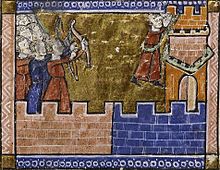Thoros (Edessa)
Thoros (short for Theodoros ; † March 9, 1098 ) was the Armenian ruler of Edessa at the time of the First Crusade .
Thoros had started his public career in the Byzantine civil service and became an officer under Philaretos Brachamios . Under Philaretus he became governor of Edessa around 1090. Emperor Alexios I Komnenos had given him the high Byzantine official title of Kuropalate . 1094 Edessa was founded by the Seljuks under Tutusch I. ingested. Thoros submitted and was appointed Edessa's administrator by Tutusch. Shortly afterwards he succeeded in overpowering the Seljuk garrison, killing the local Emir Bouzan , and raising himself to ruler of Edessa. The chronicler Matthias von Edessa calls him "Thorus, son of Hethum" in this context.
Although he was an Armenian himself , he was unpopular with his subjects. One of the reasons for this was that, in contrast to his mostly Armenian Orthodox subjects, he was a Byzantine Orthodox Christian and, on the other hand, he was unable to protect them militarily against the Seljuks. The city fortress of Edessa withstood attacks by the Seljuks, but Thoros was powerless against regular Seljuk raids on Edessa's trade and agriculture. As his situation became more and more precarious, Thoros sought the help of the crusaders of the First Crusade, who had begun in October 1097 to besiege the Seljuks in Antioch . A general of the Crusaders, Baldwin of Boulogne , did not take part in the siege, but apparently strove to gain control for himself. Around New Year 1097, Baldwin had taken the fortresses of Turbessel and Ravendel on the Euphrates when Thoros' invitation reached him. Instead of simply being recruited as a mercenary , he succeeded in being adopted as a son by the childless Thoros on his arrival in Edessa on February 6, 1098 and made co-regent and heir. Baldwin's military aid in the following weeks significantly reduced the threat of Selschuk raids on the Edessa region.
A short time later, on March 7, 1098, the Armenian inhabitants of Edessa rebelled against Thoros. He was abandoned by his troops and locked in his palace. Baldwin did not help him, but advised him to surrender. Thoros offered to resign on the condition that he was given safe conduct to his father-in-law Gabriel von Melitene . The offer was rejected and Thoros was seized and murdered by Armenian residents two days later while attempting to escape from his palace. The following day, Baldwin was asked by the population to take over the government and became the first Count of Edessa . To what extent Baldwin was involved in the conspiracy for the uprising is unclear, in any case he did nothing to protect his adoptive father.
Individual evidence
- ↑ a b Ara E. Dostourian (transl.): Armenia and the Crusades, Tenth to Twelfth Centuries. The Chronicle of Matthew of Edessa. University Press of America, Lanham 1993, p. 163.
literature
- Steven Runciman: History of the Crusades . Beck, Munich 1995, ISBN 3406399606 , pp. 185-202.
| personal data | |
|---|---|
| SURNAME | Thoros |
| BRIEF DESCRIPTION | Ruler of Edessa |
| DATE OF BIRTH | 11th century |
| DATE OF DEATH | March 9, 1098 |
| Place of death | Edessa |
